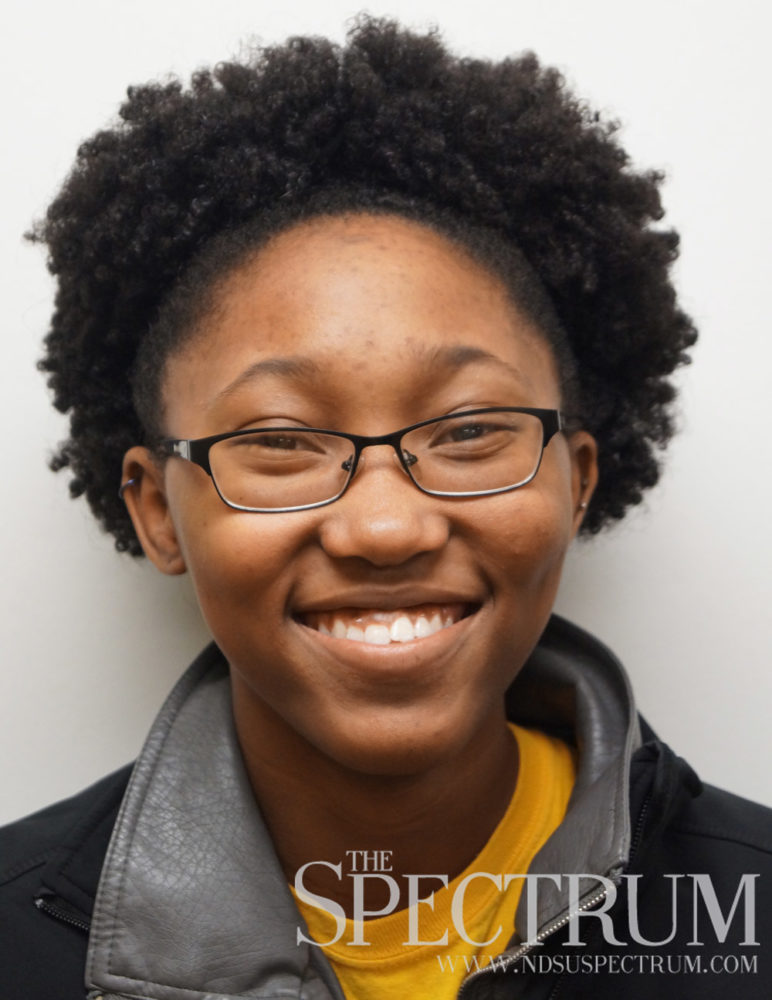
Pheafrisia Strachan’s hair is part of her identity. “So when people
sort of make a big deal about it make me feel uncomfortable … I don’t like it,” she said.
Listen carefully to Pheafrisia Strachan speak, and you might catch the way she drops the ‘g’ in words ending in ‘-ing.’ You might notice the way she holds her ‘o’s a bit longer, and maybe pronounces all her vowels just a little differently.
You might even pick up on her use of ‘aks.’
But then, you’d have to listen carefully.
The sophomore veterinary technology major mostly sounds like any other student on the North Dakota State campus.
Still, she said as a black student, the way she talks is just another means by which others pinpoint her as different.
“People say that you speak black,” she said. “And speaking black is seen as speaking uneducatedly, but it’s just ebonics. It’s just the way people grow up.”
Strachan is one of 379 students on the NDSU campus who identify as black or African American.
Though the days of segregation have passed, these students still experience the effects of microagression — lingering, everyday forms of racist interactions, whether intentional or not, that communicate negative messages to minority groups.
For Strachan, the form she’s most commonly experienced involve touching her hair.
“People are like ‘Oh, can I feel your hair? It must feel like cotton,’” she said. “And that’s a horrible reference to use with a black person.”
As a native of the Bahamas, Strachan was not used to these sorts of interactions. She said in Nassau, New Providence, the city she grew up in and the capital of the Bahamas, the majority of the population is black.
Though she said she’s normally very open and willing to brush comments off, she said this is one topic where at times she’s needed to tone down her temper.
“Over time, it’s gotten progressively more annoying because I am still a human being,” she said. “I don’t ask to touch your hair. That’s not socially acceptable.”
Strachan said she has experienced people touching her without her permission or questioning her if she tells them they can’t.
“Because it’s my body,” she said. “You don’t go around grabbing my boob. That’s not a good thing to do. It’s an extension of me.”
She said it’s also the one form of microaggression she’s found the hardest to accept.
“We all have hair. It’s just that it comes in different forms,” she said. “It’s the same thing, it’s just that our follicles are shaped differently so it comes out differently and it stays in one shape. What’s on your head is on my head.”
The most frustrating is being told she should straighten her hair. She said no matter the intent, the sentiment says: “I should change myself just to please you.”
Once, as a high schooler, Strachan was told she would need to change her hair in order to be successful.
“One of my teachers told me, ‘You’re gonna have to relax your hair because natural hair isn’t professional,'” she said. “That hurt my feelings so bad, and I went home and I cried to my mom,”
“That was, at least for me, one of the biggest things because my hair is a part of my identity. This is just a part of me, so when people sort of make a big deal about it or make me feel uncomfortable or like I’m so different because my hair is different, it’s just … I don’t like it.”
Strachan said questions and touching related to her hair are the most common form of microaggression she’s experienced. But she’s heard of much worse.
She said one of her friends was called the N-word while he was off campus in Fargo.
Other friends, while talking to each other in their native language on a local bus, were interrupted by a group of fellow passengers with: “You’re in America. Speak English.”
Strachan said she thinks her experience has been more positive because she comes from an English-speaking country and her skin is lighter than others.
“Brighter is seen to be beautiful. The darker your skin is, the more ‘evil’ you are or something,” she said. “I don’t get it.”
She hasn’t forgotten her first racist interaction and the way it made her feel.
As a 16-year-old in Nassau, she said she sat on a bus stop bench next to a white woman. Strachan watched as the woman looked out of the corner of her eye, slowly picked up her purse, set it on the other side of her body and slid to the other end of the bench.
“I am just like, ”Lady, I am 110 pounds, soaking wet, I’m only 5 feet. I can’t do anything.’ I don’t know what could have possibly scared her, but that was just like, ‘Oh my gosh, people are actually like this.'”
Strachan said the best thing students can do to become more aware is ask questions and listen to the answers.
“Even if you speak differently, this is your chance to learn the way another person speaks,” she said. “If they eat different food than you do, this is a chance to eat another food that you never tried before.
“Listen and learn.”
